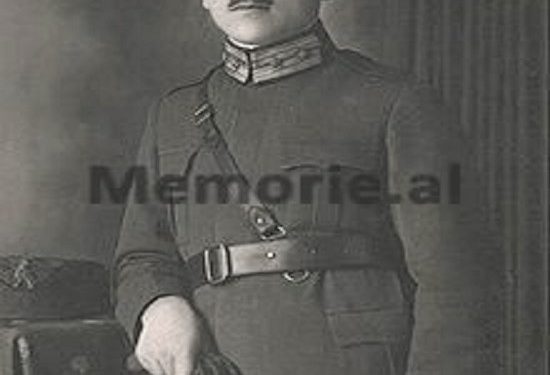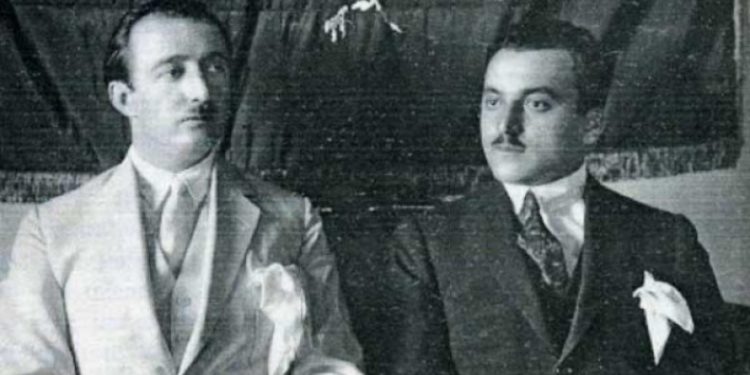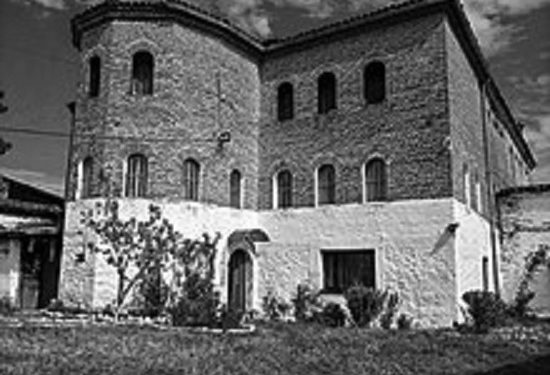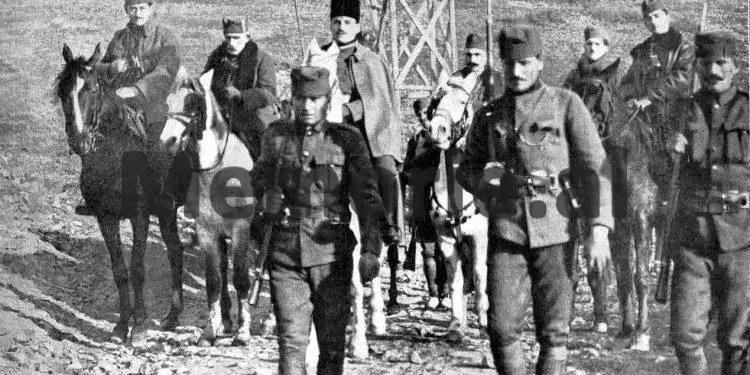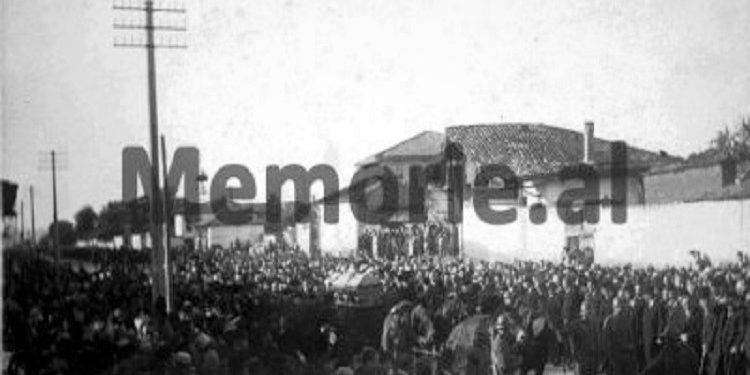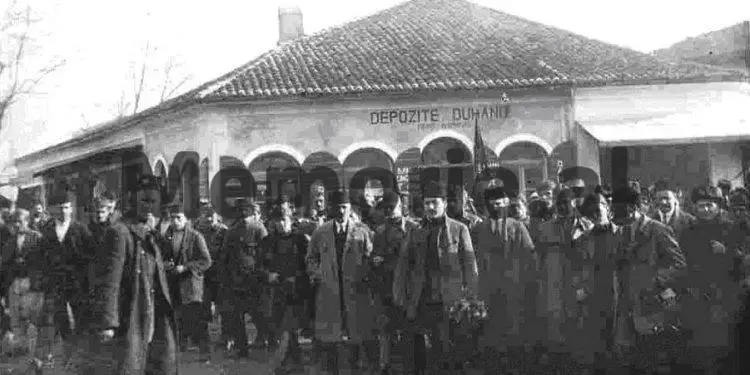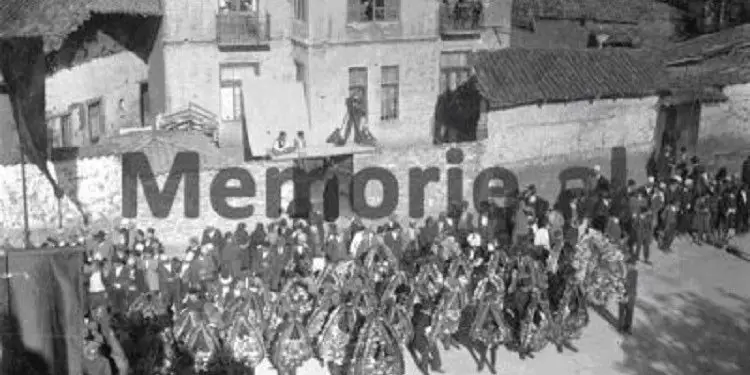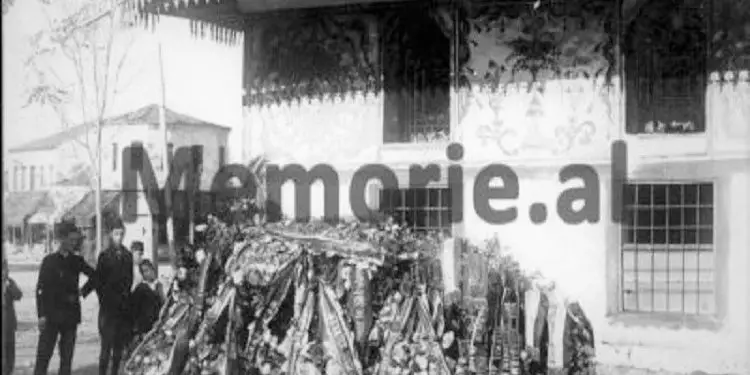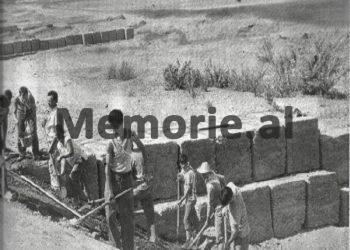From Lulezim Mjeku
The first part
Memorie.al / In order to reflect the figure of Ceno bey Kryeziu, a review of the historical circumstances of the 20s of the last century is needed. President Zog appointed him Minister of Internal Affairs, after Ceno had helped him return to power. The opposition of that time accused King Zog of ordering the minister Ceno beg Kryeziu to organize the murders of Bajram Curri and Luigj Gurakuqi. According to Sejfi Vllamas, a political actor of the time, the relations between President Zog and Ceno bey Kryeziu, deteriorated even more. Official Tirana began to look at Ceno bey with suspicion, mainly as a man who pursued politics to the detriment of Albania’s interests. Ceno Bei was appointed ambassador of Albania in Belgrade, at a time when relations between Albania and Yugoslavia were strained due to the agreement that Albanian President Ahmet Zogu had made with Italy.
The Yugoslavia of that time saw itself endangered by the Albania-Italy Friendship Agreement and began with diplomatic and military pressure along the border with Albania. Found in this situation, the Albanian President, Ahmet Zogu, had to take actions in defense of the country.
Yugoslavia accepts Kryeziu as minister of Albania in Belgrade
According to the researcher Ilir Ushtelenca, President Zog, in addition to military measures, he thought of using the connections of Ceno bey Kryeziu with the dignitaries of Belgrade, in order to soften the enmity of Yugoslavia. Although Kosovar, Yugoslavia accepted that the ambassador, or as it was said in the world; Minister of Albania in Belgrade, to be Ceno bey Kryeziu. According to Ushtelence, (“Diplomacy of King Zogu I”), on March 22, President Zog asked Cen Bey to return for “consultations”, but he did not respond. After three more telegrams, Ceno did, announced that he; “he had to stay for some time due to the ministerial crisis in Serbia”.
Such relations seem to have continued with this time, until the outbreak of the Gjurashkovic case. When the Albanian authorities arrested the interpreter of the Yugoslav consulate in Durrës, Vuk Gjurashkovic, Ceno Bey’s secret correspondence from Belgrade with the pro-Yugoslav elements in Albania was also understood.
Yugoslavia asked for the release of Gjurashkovic, since he worked in its offices in Albania, while the Tirana authorities replied that he was an Albanian citizen, a Montenegrin from Shkodra, and that the representations of Yugoslavia in Albania had not notified him anywhere that he was working for them. When Yugoslavia withdrew its envoy from Tirana, President Zog ordered Ceno bey to immediately return to Tirana.
According to Ushtelence, before leaving Belgrade, Ceno Bey made a statement: “Today I am leaving for Tirana, to explain personally to the President of the Republic, what a big mistake has been made in the termination of diplomatic relations between Albania and your country. I explained this to him many times in telegrams, but without success. The effects were stronger than all my urgent telegrams”, said Ceno bey Kryeziu.
After a procedure, relations between these two states were restored, with Albania’s diplomatic victory.
Instead of Ceno bey Kryeziu, Minister of Albania in Yugoslavia, Tahir Shtylla was appointed. President Zog, who according to the author Zhivko Avramovski, had understood in 1925, Ceno bey’s connections with the Yugoslav secret service, although he removed Kryeziu from Belgrade, appointed him minister in Czechoslovakia, but at the same time, kept him accredited in Yugoslavia.
According to the Albanian researcher Ilir Ushtelenca, this was done to show the international opinion that he was not vengeful or angry. And according to Ushtelence, when Ceno bey Kryeziu returned to Tirana, to regain the lost trust, he denied what he had declared in the newspaper “Politika” on June 16, 1927.
The Albanian diplomat, Ceno bej Kryeziu, arrives in Prague!
On his way to Prague, Ceno passed through Belgrade, where he stayed throughout September and the first days of October. When the Tirana authorities sent messages to him to leave and start the work of the Albanian minister in Prague, he replied that; he lacked money for the road. Ceno bey Kryeziu finally reached Prague, but on October 14, he was killed by the student Alqiviadh Bebi. The press of the time accused the National Revolutionary Committee (KONARE) and Albanian patriots in Yugoslavia of the assassination. The Albanian president, Ahmet Zogu, experienced the news of the murder of his sister’s husband hard.
According to Ushtelence, “Zogu had a nervous attack when he heard about the death of his sister’s husband.” He cried for days, in front of the elite who went to comfort him, as well as in front of Ceno Bey’s brothers, but the truth never came to light. First, that in the beginning, Alqiviadh Bebi, claimed that; you had killed him yourself, without anyone’s order, secondly because; he was killed by the brothers of Ceno bey themselves, in the courtroom”.
This was the end of the life and diplomatic career of Ceno bey Kryeziu, one of the people who helped Ahmet Zogu to return to power in December 1924. However, the assassination echoed not only in Prague and Tirana, but also throughout Europe. The newspapers of the time, and not only the Czech and Yugoslav ones, reported on the event.
Czech newspapers paid attention to this event, not only by reporting it, but they tried to shed light on the behind-the-scenes of the murder, insisting on the publication of articles and analyses, which reflected the implications of the murder of Ceno bey, in the relations between Tirana – Belgrade, but also in Prague.
“České Slovo”: The murder of the Albanian diplomat in Prague
It was the time of good relations between Prague and Belgrade, and the time of the Little Entente, a regional collective security mechanism. In 1926, Yugoslavia opposed Albania’s request to be accepted into the Little Entente, because in case of acceptance, Yugoslavia was obliged to respect the independence, territorial integrity and inviolability of Albania’s borders. This whole story takes its bitter end.
The murderer of Ceno bey, Alqiviadh Bebi, was being tried in a Prague court, but before the court sentenced him, he was sentenced to death in the courtroom by Zija Vučiterni, adjutant of Gani beg Kryeziu. Vuçiterni shot Alqiviadh Bebi with a pistol and, in addition to killing him, also wounded an Italian journalist. In her trial, Zija Vuciterna, admitted that he committed the murder, with the words; “I got the hack of my brother, Ceno Begut”.
The day after the murder of Ceno bey Kryeziu, the Czech daily “České Slovo” reported the event on page three, under the title “Murder of the Albanian diplomat in Prague”. The newspaper announced that; the killer Bebi, had shot Ceno ben twice in the head with a revolver. “České Slovo” announced as follows: “Last night at nine fifty minutes, at the moment when Ceno Bey was leaving the ‘Passage’ cafe, a young man came out of the wardrobe and killed the Albanian envoy in Prague with several shots, Ceno ben.
The Albanian diplomat, not suspecting anything, was looking for his jacket, when an unknown eighteen-year-old boy approached him from behind and shot the victim twice with his butt. After the murder, the Glover was stopped by the guard and did not try to escape at all. Manually is also Albanian, named Alqiviadh Bebi from Elbasan, born in 1904.
In the mess upthat was created, at first it was not known who it was about and whether it was suicide or assassination. The newly arrived friends of the ambassador wanted to lynch manually on the spot, if the staff of the café did not react decisively and remove the ambassador’s corpse in time. The music in the café continued to play, so there was no panic.
After the police listened to the manually, they realized that he followed the victim for three whole days and last night he was sitting in the gallery, near the music and from time to time, he went to the wardrobe to see when the ambassador would come back to get the clothes own. The café was immediately closed and no one was allowed to leave until the police arrived. The seriously injured ambassador was taken to the hospital. Immediately after the murder, the manually stopped and said these words; “Where are you, man, I’ve been waiting for you for six days, to kill you”?!
The reasons for the assassination, according to manually, are political. In fact, Ceno did, in the context of the Yugoslav-Italian conflict, in the Tirana agreement; he had taken a stand against the Italian attack on Yugoslavia. Doctor Štajni from Bubence gave him the first aid, immediately after the assassination attempt. He found that the two shots to the head caused heavy bleeding. Although he stopped the bleeding, Ambassador Ceno died during the transport to the hospital.
Ceno Bey wanted the Balkans to belong to the Balkan peoples.
The hand of the Albanian ambassador, Alqiviadh Bebi, is from Elbasan, born in 1904, a student of the sixth grade at the lyceum in Rome. He came from Vienna to Prague on October 10. The next day, October 16, “České Slovo”, on page two, says that; the murdered Albanian ambassador Ceno bey, came to Prague a few days ago and settled in the “Passage” hotel. Ceno bey, as early as during the war, in 1915, was in Prague with lieutenant colonel Roter in Smihov, located at ‘Smetanova’ street number 15. When he came to Prague, he visited the Roter family and was an honored guest in the house theirs. Ceno Bey has realized that there is an Albanian circle in Prague and has expressed interest in getting to know the members of this circle.
Mr. Fhmel, a stamp maker in Prague, who during the war was a translator in the 28th regiment, visited Lieutenant Colonel Roter on Friday afternoon, to arrange the ambassador’s meeting with the Albanian exile. Mr. Rottel received Ceno bey, who did not come, because on his way to Prague, he fell ill with malaria and had to stay in bed.
Ceno Bey came as an ambassador to Prague with economic programs and wanted to get closer to our representatives of economic life and industry. According to the information, he intended to develop in Albania, a colonization of sugar-growing Czechs and to build a sugar factory there. He also wanted our exporting circles to pay more attention to Albania and send their representatives there.
His other goal was for Albania, at the spring fair in Prague, to present the state exhibition and to Czech importers, to present the raw materials, which could have been imported from Albania to the Czech Republic. Otherwise, a Czech company has built a power plant in Durrës, for 12 million crowns, paid in gold coins. The 32-year-old Ceno Bei was full of ideals for Albania.
Ceno, the bey made great efforts for better economic contacts and relations with Czechoslovakia. Having independent Albania as his leitmotif, he wanted the Balkans to belong to the Balkan peoples. Ceno Bey was the son-in-law of the current President, Ahmet Zogu. His grandiose plans, for the status of independent Albania and for the achievement of friendly and economic contacts, with the Republic of Czechoslovakia, were interrupted with a shot, from the revolver of a young Albanian fanatic, ill-informed, about the efforts of the Albanian ambassador. “.
Did Alqiviadh Bebi give him his real name?!
“České Slovo”, of the same day, October 16, on the third page, reports on the further developments surrounding the murder, with the title “Police interrogate the murderer of the Albanian ambassador”. The brother of the murdered man comes to Prague. During the hearing of Ceno Bey’s attacker, which took place overnight, when the assassination took place, it was learned that Dorasi is 24 years old, comes from Elbasan and is fatherless. He was admitted to the “Monte Carlo” College, where he studied ancient and modern philosophical literature and economic works.
Books with such content were found during the search of his apartment in Prague, which proves such statements.
He came to Prague via Vienna, three days earlier, with the intention of killing Ambassador Ceno Bey. Last night, after nine o’clock, he went to the “Passage” café, in Vaclavske Namesti, and dictated to Ambassador Ceno bey there. When shortly after ten o’clock, the ambassador left the café to go to the cloakroom, immediately after him came the Glover and, getting very close to him, stabbed him from behind twice.
According to the words of the witness Eisenstein, Doras said that this act of his does not mean the end of the assassination. According to some witnesses, others reported to the Police at critical moments, Alqiviadhi had talked with some young people, who immediately after the assassination used the tunnel and left. The witnesses said that they were around 25-30 years old. Dorasi has admitted that; from the authors he has read with passion, he has acquired pessimistic thoughts towards life. The “Golt” type revolver, with which he killed the ambassador, he bought three years earlier, when he thought of ending his life.
Baby, he did not know Ceno bey personally. For this, he bought illustrated magazines, in which he saw the photos of the diplomat, and based on these photos, he identified Cena bey, in the “Passage” café. Doras has also admitted that he asked Ambassador Ceno Bey for an audience and he did not accept it. The hearing lasted until four in the morning and yesterday afternoon, Bebi was handed over to the country’s criminal court.
According to the latest information, the deceased was the son-in-law of Ahmet Zogu, the current President of Albania. The brother of the deceased, a captain in the Albanian Army, named Gani bey Kryeziu, was informed immediately after the assassination, via telegraphic news. For the burial of the deceased, the proposals of Gani bey Kryeziu, who is on the road from Belgrade to Prague, are awaited. “Ceské Slovo”, following the article, asked a question: Has Bebi given his real name and new arrests are expected?! The killer is calm and constantly repeats that he killed the ambassador for political reasons. The police think that his passport is forged and that his name, Alqiviadh Bebi, is not real and that he has another name, which may be similar to the case of Cichinkov.
However, the attacker rejects these statements of the Police and firmly says that; passport and his name, is true. However, it is believed that the attacker had accomplices who either supplied him with money, or gave him information on where the ambassador lives and which place would be the most suitable to carry out the assassination.
Investigations continue with great intensity and the possibility of further arrests is not excluded. In continuation, the newspaper announces that; Minister of Foreign Affairs Dr. Eduard Benesh, has sent his regrets to the Albanian Government and expressed his heartfelt condolences. Last night, he talked with the Czech consul in Albania; architect Matushken, about this tragic event.
In Belgrade, regret for the murder of ambassador Ceno bey!
“České Slovo” also publishes news of its correspondent from Belgrade. The news about the murder of the Albanian ambassador in Prague, Ceno bey, both in Prague and in Belgrade, has caused deep regret, both in the public and in the press. Ambassador Ceno bey, in Yugoslav circles, has enjoyed great sympathy for his open and courageous attitudes, known by the slogan; “The Balkans to the Balkan peoples”.
Ambassador Ceno Bey has managed to adopt this principle even in the known conflict in the Gjurashkovic dispute and has used all his influence in Tirana, for a good conclusion of this context. The Belgrade newspaper “Politika”, dated October 15, blames Rome for this assassination and says that; Rome has now taken on the role of peace breaker in the Balkans, which earlier Vienna had.
Just as Serbia once stood in Vienna’s way to the Balkans, so today Yugoslavia is the main obstacle against Rome’s imperialist plans. With the assassination of Ambassador Ceno Bey, the idea of a free Albania and the freedom of the Balkan states, which Ceno Bey represented, will not be killed. The newspaper “Politika” writes further about the coalition of international murderers, who operate with impunity across Europe. However, he thinks that this bloody coalition does not achieve its goals and that it will end in disaster, just as Vienna once ended. However, it seems that Rome has not learned any lessons from Vienna’s experience, concludes “Politika”.
The other daily, “Narodni Listy”, of October 16, 1927, publishes the article on the front page, with the title; “The murder of the Albanian ambassador in Prague”. “The young man, who was killed with two shots, on Friday evening in the wardrobe of a café in Prague, was a great son of his people, whom he had to represent to us, as the first Albanian ambassador in Prague”, wrote “Narodni Listy”.
According to the newspaper, Ceno bey, 32 years old, was a personality who gave direction to the currents of political life in Albania. Originally from Gjakova, from a family of Albanian nobles, which gave its people some influential personalities? His father was the envoy of the Turkish Sultan, Abdyl Hamit. His brother also had a high position in the Sultan’s court. During the First Balkan War, his father was at the head of the uprising against the Turks, alongside the Serbs.
The wife of the murdered man, Ceno bey, is the sister of the current Albanian president, Ahmet bey Zogut. The turn of December of 1924, against the pro-Italian regime of Fan Nol, also brought Ceno Beu, a faithful representative of the idea “Balkans to the Balkan peoples”, into power with his friend, President Ahmet Zogu, in his state career.
First he wins the place in the Government, as the supreme leader of the Albanian Army. When Albania began to reformulate the orientations of its foreign policy, in terms of relations with Italy, and in November it reached the so-called “Tirana Agreement”, Ceno Bey gave up the leadership of the Army and was appointed ambassador to Belgrade. Memorie.al
The next issue follows




